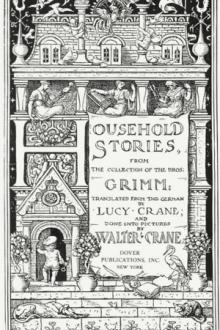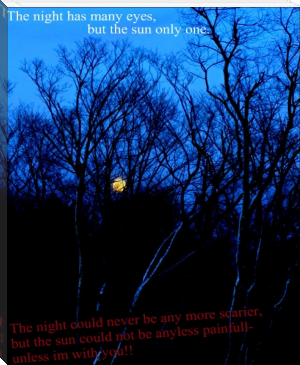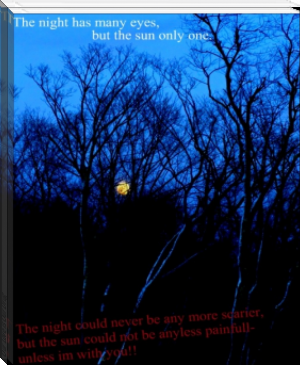Household Stories by the Brothers Grimm, Jacob Grimm [ereader for textbooks txt] 📗

- Author: Jacob Grimm
- Performer: -
Book online «Household Stories by the Brothers Grimm, Jacob Grimm [ereader for textbooks txt] 📗». Author Jacob Grimm
"Leave the little creatures alone, I will not suffer them to be stifled."
At last the three brothers came to a castle where there were in the stables many horses standing, all of stone, and the brothers went through all the rooms until they came to a door at the end secured with three locks, and in the middle of the door a small opening through which they could look into the room. And they saw a little grey-haired man sitting at a table. They called out to him once, twice, and he did not hear, but at the third time he got up, undid the locks, and came out. Without speaking a word he led them to a table loaded with all sorts of good things, and when they had eaten and drunk he showed to each his bed-chamber. The next morning the little grey man came to the eldest brother, and beckoning him, brought him to a table of stone, on which were written three things directing by what means the castle could be delivered from its enchantment. The first thing was, that in the wood under the moss lay the pearls belonging to the princess—a thousand in number—and they were to be sought for and collected, and if he who should undertake the task had not finished it by sunset,—if but one pearl were missing,—he must be turned to stone. So the eldest brother went out, and searched all day, but at the end of it he had only found one hundred; just as was said on the table of stone came to pass and he was turned into stone. The second brother undertook the adventure next day, but it fared with him no better than with the first; he found two hundred pearls, and was turned into stone.
And so at last it was Witling's turn, and he began to search in the moss; but it was a very tedious business to find the pearls, and he grew so out of heart that he sat down on a stone and began to weep. As he was sitting thus, up came the ant-king with five thousand ants, whose lives had been saved through Witling's pity, and it was not very long before the little insects had collected all the pearls and put them in a heap.
Now the second thing ordered by the table of stone was to get the key of the princess's sleeping-chamber out of the lake.
And when Witling came to the lake, the ducks whose lives he had saved came swimming, and dived below, and brought up the key from the bottom. The third thing that had to be done was the most difficult, and that was to choose out the youngest and loveliest of the three princesses, as they lay sleeping. All bore a perfect resemblance each to the other, and only differed in this, that before they went to sleep each one had eaten a different sweetmeat,—the eldest a piece of sugar, the second a little syrup, and the third a spoonful of honey. Now the Queen-bee of those bees that Witling had protected from the fire came at this moment, and trying the lips of all three, settled on those of the one that had eaten honey, and so it was that the king's son knew which to choose. Then the spell was broken; every one awoke from stony sleep, and took their right form again.
And Witling married the youngest and loveliest princess, and became king after her father's death. But his two brothers had to put up with the two other sisters.

There was a man who had three sons, the youngest of whom was called the Simpleton, and was despised, laughed at, and neglected, on every occasion. It happened one day that the eldest son wished to go into the forest to cut wood, and before he went his mother gave him a delicious pancake and a flask of wine, that he might not suffer from hunger or thirst. When he came into the forest a little old grey man met him, who wished him good day, and said,
"Give me a bit of cake out of your pocket, and let me have a drink of your wine; I am so hungry and thirsty."
But the prudent youth answered,
"Give you my cake and my wine? I haven't got any; be off with you."
And leaving the little man standing there, he went off. Then he began to fell a tree, but he had not been at it long before he made a wrong stroke, and the hatchet hit him in the arm, so that he was obliged to go home and get it bound up. That was what came of the little grey man.
Afterwards the second son went into the wood, and the mother gave to him, as to the eldest, a pancake and a flask of wine. The little old grey man met him also, and begged for a little bit of cake and a drink of wine. But the second son spoke out plainly, saying,
"What I give you I lose myself, so be off with you."
And leaving the little man standing there, he went off. The punishment followed; as he was chopping away at the tree, he hit himself in the leg so severely that he had to be carried home.
Then said the Simpleton,
"Father, let me go for once into the forest to cut wood;" and the father answered, "Your brothers have hurt themselves by so doing; give it up, you understand nothing about it."
But the Simpleton went on begging so long, that the father said at last,
"Well, be off with you; you will only learn by experience."
The mother gave him a cake (it was only made with water, and baked in the ashes), and with it a flask of sour beer. When he came into the forest the little old grey man met him, and greeted him, saying,
"Give me a bit of your cake, and a drink from your flask; I am so hungry and thirsty."
And the Simpleton answered, "I have only a flour and water cake and sour beer; but if that is good enough for you, let us sit down together and eat." Then they sat down, and as the Simpleton took out his flour and water cake it became a rich pancake, and his sour beer became good wine; then they ate and drank, and afterwards the little man said,
"As you have such a kind heart, and share what you have so willingly, I will bestow good luck upon you. Yonder stands an old tree; cut it down, and at its roots you will find some thing," and thereupon the little man took his departure.
The Simpleton went there, and hewed away at the tree, and when it fell he saw, sitting among the roots, a goose with feathers of pure gold. He lifted it out and took it with him to an inn where he intended to stay the night. The landlord had three daughters who, when they saw the goose, were curious to know what wonderful kind of bird it was, and ended by longing for one of its golden feathers. The eldest thought, "I will wait for a good opportunity, and then I will pull out one of its feathers for myself;" and so, when the Simpleton was gone out, she seized the goose by its wing—but there her finger and hand had to stay, held fast. Soon after came the second sister with the same idea of plucking out one of the golden feathers for herself; but scarcely had she touched her sister, than she also was obliged to stay, held fast. Lastly came the third with the same intentions; but the others screamed out,
"Stay away! for heaven's sake stay away!"
But she did not see why she should stay away, and thought, "If they do so, why should not I?" and went towards them. But when she reached her sisters there she stopped, hanging on with them. And so they had to stay, all night. The next morning the Simpleton took the goose under his arm and went away, unmindful of the three girls that hung on to it. The three had always to run after him, left and right, wherever his legs carried him. In the midst of the fields they met the parson, who, when he saw the procession, said,
"Shame on you, girls, running after a young fellow through the fields like this," and forthwith he seized hold of the youngest by the hand to drag her away, but hardly had he touched her when he too was obliged to run after them himself. Not long after the sexton came that way, and seeing the respected parson following at the heels of the three girls, he called out,
"Ho, your reverence, whither away so quickly? You forget that we have another christening to-day;" and he seized hold of him by his gown; but no sooner had he touched him than he was obliged to follow on too. As the five tramped on, one after another, two peasants with their hoes came up from the fields, and the parson cried out to them, and begged them to come and set him and the sexton free, but no sooner had they touched the sexton than they had to follow on too; and now there were seven following the Simpleton and the goose.
By and by they came to a town where a king reigned, who had an only daughter who was so serious that no one could make her laugh; therefore the king had given out that whoever should make her laugh should have her in marriage. The Simpleton, when he heard this, went with his goose and his hangers-on into the presence of the king's daughter, and as soon as she saw the seven people following always one after the other, she burst out laughing, and seemed as if she could never stop. And so the Simpleton earned a right to her as his bride; but the king did not like him for a son-in-law and made all kinds of objections, and said he must first bring a man who could drink up a whole cellar of wine. The Simpleton thought that the little grey man would be able to help him, and went out into the forest, and there, on the very spot where he felled the tree, he saw a man sitting with a very sad countenance. The Simpleton asked him what was the matter, and he answered,
"I have a great thirst, which I cannot quench: cold water does not agree with me; I have indeed drunk up a whole cask of wine, but what good is a drop like that?"
Then said the Simpleton,
"I can help you; only come with me, and you shall have enough."
He took him straight to the king's cellar, and the man sat himself down before the big vats, and drank, and drank, and before a day was over he had drunk up the whole cellar-full. The Simpleton again asked for his bride, but the king was annoyed that a wretched fellow, called the Simpleton by everybody, should carry off his daughter, and so he made new conditions. He was to produce a man who could eat up a mountain of bread. The Simpleton did not hesitate long, but ran quickly off to the forest, and there in the same place sat a man who had fastened a strap round his body, making a very piteous face, and saying,
"I have eaten a whole bakehouse full of rolls, but what is the use of that when one is so hungry as I am? My stomach feels quite empty, and I am obliged to strap myself together, that I may not die





Comments (0)